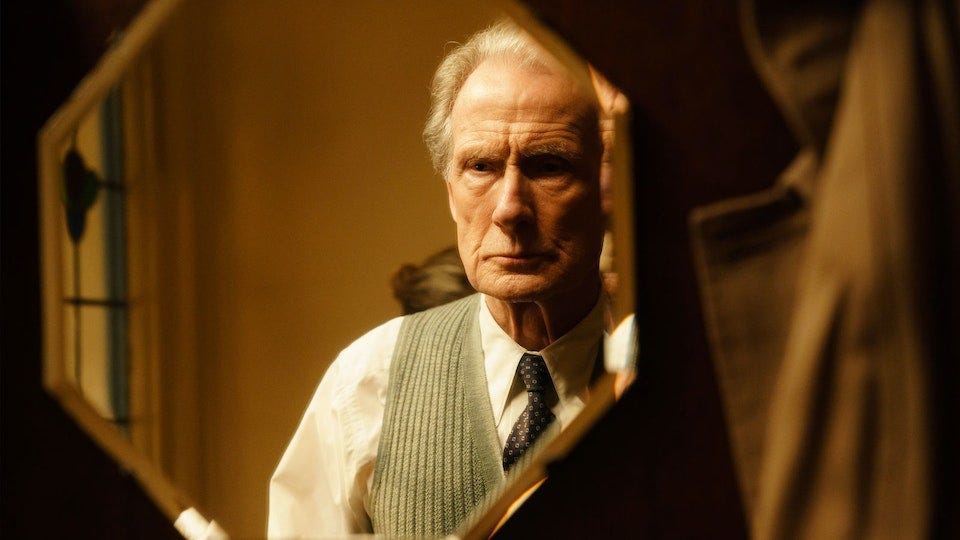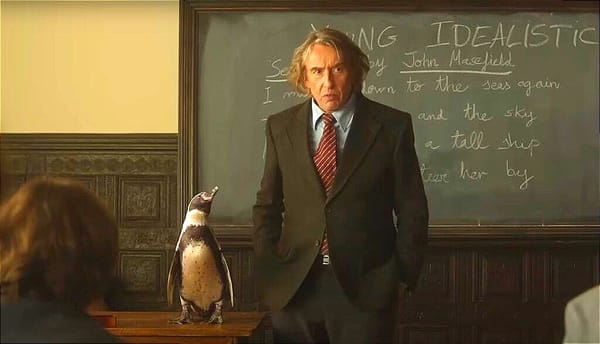Watch to Watch: Xmas/New Year's Downtime Edition
Reviews of "Glass Onion," "Babylon," "Living," and more.

The week between Christmas and New Year’s is a quiet one for movie releases and for audiences alike. It’s an unofficial downtime for people to digest the food and emotions of the holiday gatherings and ponder the unknowns of the coming year. For me, it’s a chance to catch readers up on a few films that landed in theaters and on demand in the run-up to Christmas, in case you want to get out of the house or settle into the couch. (I have some thoughts, too, about the Hulu series “Fleischman Is In Trouble,” but will wait until after the final episode has landed before digging in.)
Intriguingly, two movies are out right now from directors I’ve followed with admiration for a number of years. One of them confirms a mischievous and terrifically smart old-school craftsmanship. The other is a belly flop of epic proportions.

The good news first: Among the many pleasures of “Glass Onion: A Knives Out Mystery” (⭐ ⭐ ⭐ 1/2, streaming on Netflix) is the sheer confidence of its storytelling. Writer-director Rian Johnson started out as a clever boy with his 2005 high-school noir “Brick” – down these mean cinderblock halls a man must go – and has only gained in wit and filmmaking chops over five ensuing films in 17 years. (The only dud is his antic 2008 sophomore slump film “The Brothers Bloom,” one of the few movies I’ve ever wanted to slap.) Between this sequel to “Knives Out” (2019) and the upcoming Peacock Network series “Poker Face,” Johnson has doubled down on his love of hokey/lovable murder-mystery tropes. “Poker Face” revives the old “Columbo” “howcatchem” format with a new mystery every week and a roster of stars that includes Natasha Lyonne (in the lead), Joseph Gordon-Levitt, and Stephanie Hsu of “Everything Everywhere All at Once.” The “Knives Out” franchise, for its part, mashes up Agatha Christie, Clue (the board game), and puzzle-box cult films like “The Last of Sheila” with a soupçon of Foghorn Leghorn in Daniel Craig’s southern-fried detective Benoit Blanc. Johnson is one of the few working directors who has a blast making movies, and his enthusiasm comes right off the screen – his films can make you giddy with happiness.
“Glass Onion” brings back Craig as Blanc – a more finely carved ham you’ll rarely find – and deposits him on a private Greek island with a billionaire Internet CEO (Edward Norton), four of the billionaire’s sleazy friends (Kate Hudson, Kathryn Hahn, Leslie Odom, Jr., and Dave Bautista), and one simmering enemy (Janelle Monáe). Someone ends up dead, and then another someone, and then, as in “Knives Out,” Johnson doubles back to before the beginning and delivers some crucial information that changes everything we (think we) know while deepening the mystery further. But the real high of “Glass Onion” comes from the smart, satiric details embedded in the production and dialogue – the throwaway lines that reveal the characters’ absurdist corruption, the Old Masters glimpsed on the walls of the CEO’s glass mansion, the way Johnson and his cast play fair by the rules of the locked-room mystery genre while also sending it up with brio and crackerjack timing. And the cameos! I won’t spoil the walk-ons, but I will say that two beloved show business icons who have since passed on make their final appearances here, and one of the biggest belly laughs comes with our introduction to someone who can only be Benoit Blanc’s domestic partner.
Chances are you’ve seen “Glass Onion” already – it premiered on Netflix last week after a one-week run in theaters and currently sits atop the streaming giant’s list of most popular titles. It’s a tonic at a time of depressive movies and dire headlines – a silly movie made by smart people who are serious about their commitment to mainstream entertainment. As an unexpected plus, a film that was made in the summer of 2021 turns out to have a felicitous relevance to late 2022 in Norton’s portrayal of a preening idiot tech bro. Johnson has implied that the character of Miles Bron is kinda-sorta based on Mark Zuckerberg (among others), but a lot of young men on the Interwebs are angrily convinced that Miles is a fatuous cartoon version of their hero, a certain electric-car manufacturer and current social-media man-baby. I say if the shoe fits, let Elon wear it.
More good news: Rian Johnson is already at work writing the next “Knives Out” movie. Maybe that will help dispel the lingering acrid aftertaste of “Babylon” (⭐ 1/2, in theaters now, on demand TBA), Damien Chazelle’s epic folly of 1920s Hollywood. I’ve been defending this filmmaker from people who found “Whiplash” (2014) far-fetched or cruel, “La La Land” (2016) a faint Xerox of big-screen musicals, or his Apollo moon landing drama “First Man” (2018) from – well, no one saw “First Man,” so it doesn’t matter. Chazelle loves movies every bit as much as Rian Johnson, but he has an ambitious streak that has always threatened to prove fatal and finally has. Johnson’s own sizable ambitions seem tempered by self-awareness and humor; Chazelle’s sense of humor in “Babylon” is exemplified by an opening scene in which an elephant takes a large, liquid shit on a man and, through the miracle of camera placement, on the audience itself. We have been warned — and there’s still three hours to go.

There follows what can only be considered the “Intolerance” of party sequences, a Jazz Age movie-colony bash where hundreds writhe in half-clothed copulation, cocaine is hoovered by the bowlful, and that elephant trundles through like the one innocent at the orgy. The scene is all excess and little artistry, Cecil B. DeMille meets Federico Fellini at the corner of Hollyweird and Vain. (Will there be a dwarf? There will be a dwarf, one toting a giant papier-maché phallus.) We are introduced to Nellie LaFoy (Margot Robbie, above), a wannabe star and wild-child tootsie who suggests Clara Bow with her finger in an electric socket. We meet Jack Conrad (Brad Pitt), a matinee idol with the suave assurance of Douglas Fairbanks; gossip queen Elinor St. John (Jean Smart), a portmanteau of celebrity journalist Adela Rogers St. Johns and celebrity novelist Elinor Glyn; Lady Fay Zhu (Li Jun Li), an exotic leading lady with the career path of Anna May Wong and a cabaret act swiped from Marlene Dietrich.
There are more, all based on real actors, directors, writers, and producers of the Silent Era, and all of them barreling toward obsolescence as the moviegoers of America decide with awful suddenness that they want to hear these gods and goddesses talk. The best scenes in “Babylon” deal directly with the transition to the Talkie Era and the wrenching industrial reboot that left so many casualties in its wake: the mummified film sets, the desperate voice lessons, the careers destroyed in a single onscreen sentence. The worst are any of the scenes that involve Robbie’s Nellie – interminable, improvised, shrill. Chazelle wants to take us into an all-American circle of Hell, quite literally with a visit to an underground S&M club overseen by a degenerated Tobey Maguire, the film’s low point geographically and aesthetically. “Babylon” is a setting without a story, a metaphor without a referent, and it works itself up to a mawkish “statement” about the history of American movies that makes no damn sense at all. To someone who loves this period of the movies and its cultural history – and has written about both at length – the movie is a squandered opportunity and a vulgar response to vulgarity. In short, what Harry Warner would call a shonda.
When I first heard that Akira Kurosawa’s 1952 masterpiece “Ikiru” (“To Live”) was being remade, I thought What’s the point? When I heard that Bill Nighy was involved – that peerless phantom of British acting – and that Kazuo Ishiguro (“The Remains of the Day”) was writing the screenplay, I began to recalibrate my expectations. And having now seen “Living” (⭐ ⭐ ⭐, in theaters now, on demand TBA), I can say, Ah, right, that’s the point: To be jogged into an appreciation of the time we spend on Earth while we’re actually spending it, a message that can withstand being remade again and again, even when it is remade poorly, which the new film is not.

As in “Ikiru,” our hero is an aging civil-service bureaucrat, a faceless cog in the flywheel of lower government, here named Mr. Williams by his colleagues and Mr. Zombie by the secretaries (or one secretary, played with rawboned charm by Aimee Lou Wood of Netflix’s “Sex Education”). Ishiguro knows from emotionally constipated Britishness, and Nighy plays his role as a genteel black hole of diffidence, a man who probably came out of his mother’s womb wearing a bowler hat. To his son and daughter-in-law, Mr. Williams is a maddening enigma; to the younger bureaucrats under him at the Central London Office of Paper-Pushing, he’s a demi-god and a sphinx. When his physician tells him that the cancer has progressed to the point where he has but a few months to live, Mr. Williams simply mutters, “Quite.”
Ishiguro and director Oliver Hermanus keep the action in the early 1950s of the Kurosawa original – the wounds and ruins of the late war are still visible in both movies – but they’ve brought in cinematographer Jamie Ramsay to give “Living” a soft-focus, candy-colored period glow. It’s as though you’re peering through a time tunnel to a London long gone, or maybe we’re just looking through Mr. Williams’ eyes as he sees – really sees – the world through which he’s been sleepwalking for six decades. Dogged by a pretty piano-driven score that’s the film’s one bit of sweetening, the hero goes AWOL from work and eventually returns to life, pouring his diminishing energies into unraveling the red tape that keeps a community playground from becoming a reality. Both “Ikiru” and “Living” do their best to dodge sentimentality, “Ikiru” through the rigor and tenderness of Kurosawa’s filmmaking and “Living” through the magnetic reserve of its lead actor. The Bill Nighy man is a tilting mast on a ship that has run aground; his thoughts (and they are many) seem to get hijacked on their way to his mouth through fear or politeness or absent-mindedness or, as in this movie, a repression he shares with his countrymen but takes to an extreme that is equal parts comedy and tragedy. Watching Mr. Williams approach death by coming back to life is like watching a tortoise poke its head past its shell for the first time in years or the sun come up after a long season of grey. A fine movie, and one that does no dishonor to its original.
Sarah Polley’s “Women Talking” (⭐ ⭐ ⭐ 1/2) also came to theaters last week; I reviewed the film when I saw it at Toronto in September and it landed on my Best of 2023 list on the strength of its large, heartsore cast and the empathetic clarity of Polley’s storytelling, especially impressive given the restricted setting. (Hildur Guðnadóttir’s delicately supportive score is another plus.) Not an easy film, but a necessary and worthy – and even liberating – one.

Speaking of Fellini-esque overkill (see “Babylon,” above), the new film by Alejandro G. Iñárritu has landed on Netflix, and it’s a lulu, a work of towering self-indulgence from a genuinely gifted filmmaker. Iñárritu likes wordy titles — remember “Birdman or (The Unexpected Virtue of Ignorance)”? — and “BARDO, False Chronicle of a Handful of Truths” (⭐ ⭐ 1/2) is nothing if not prolix in both its dialogue and visuals. It’s a dreamlike fable of one man’s life, that one man — a superstar journalist played by Daniel Giménez Cacho (above) — clearly a stand-in for the director himself, so forgive yourself a roll of the eyes when you get to the inevitable crucifixion scene. Better experienced in a theater than on the small screen, the movie’s an onslaught of gorgeous cinematography (courtesy of Darius Khondji) and borderline tedium that only comes together like a master chef’s soufflé in the final act, when all that magical-realist mishegoss is revealed to be a life filtered through a fading consciousness. (Check the title.) That sounds like an awful lot of work — and it is — but rewards are there for the hardy magpies among you movie-lovers.
Classic discovery of the week: “Murder, He Says” (1945, ⭐ ⭐ ⭐, streaming on the Criterion Channel), a slapstick suspense comedy – that’s right – that keeps surprising a viewer with its invention and sheer craziness. Fred MacMurray is in excellent farcical form as a traveling pollster encountering a murderous Ozark clan headed up by Marjorie “Ma Kettle” Main (with a whip!), Peter Whitney (as homicidal twins), Helen Walker as a pretend bank robber, Barbara Pepper as a real bank robber, and so on. There’s a potion that makes people glow in the dark, trap doors, secret passageways, and a general refusal by the cast and director George Marshall to take any of it seriously. Good tongue-in-cheek fun, and if you can get kids to sit still for a black-and-white film, they’ll be beside themselves with apprehension and delight.
Thoughts? Don’t hesitate to weigh in.
If you enjoyed this edition of Ty Burr’s Watch List, please feel free to pass it along to friends.
If you’re not a paying subscriber and would like to sign up for additional postings and to join the discussions, here’s how:
Lastly — best wishes for the new year! May 2023 continue on a trajectory of hope.





